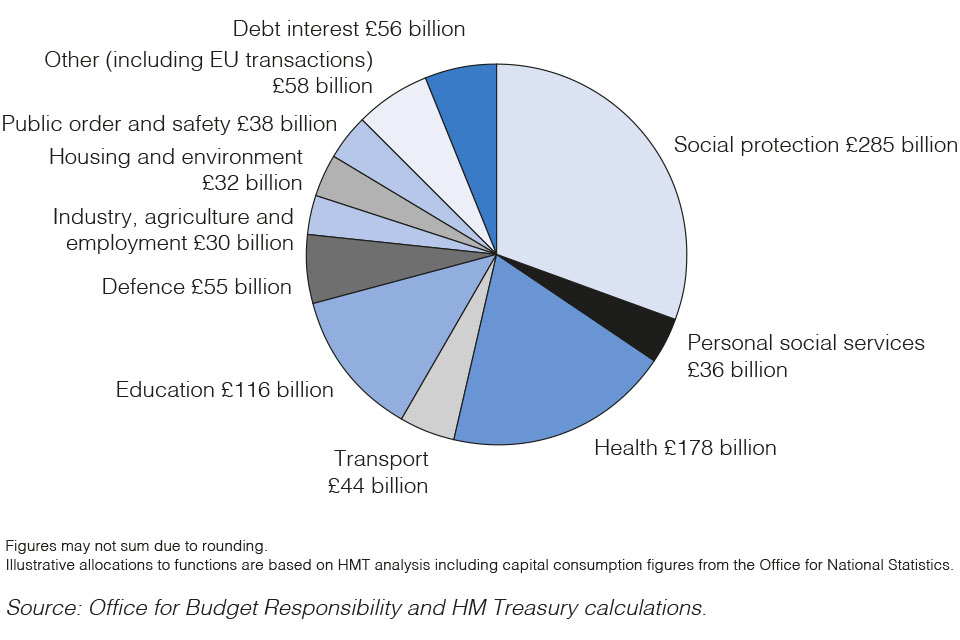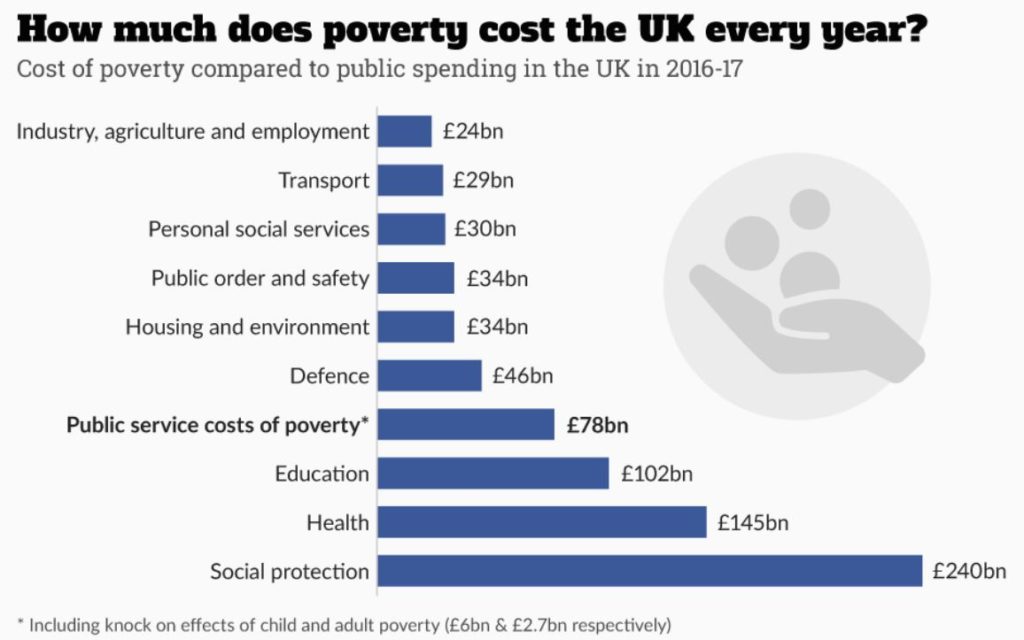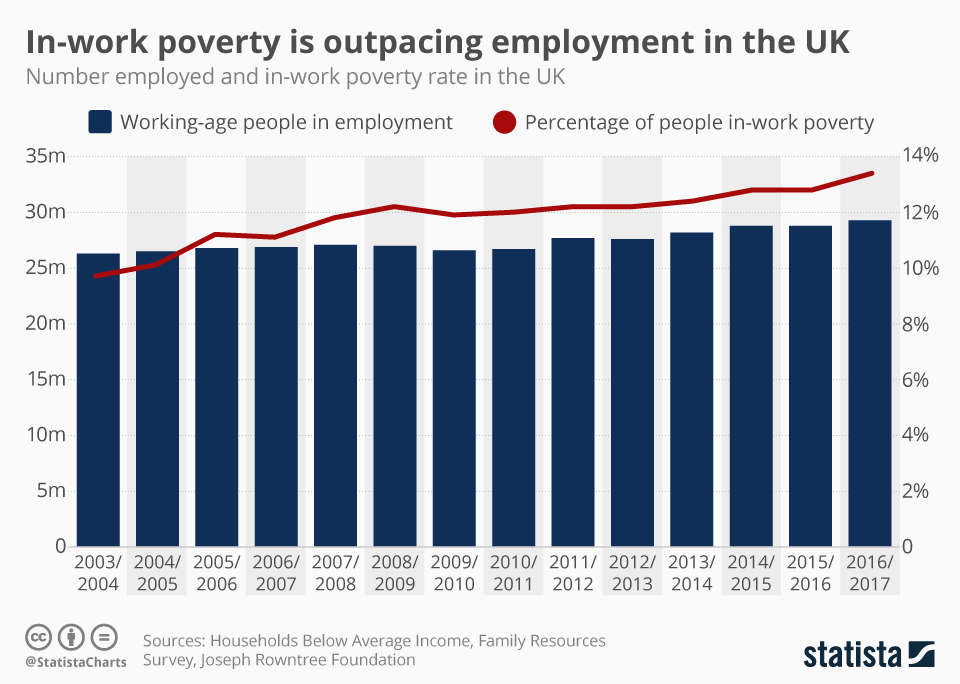The UK will spend £285 billion on benefits this year. A Georgetown University Report and the Welsh and Scottish governments believe it is feasible to eradicate UK poverty for the paltry sum of £67 billion. Can such a complex issue such as poverty be tackled with merely 3.4% of UK GDP?
UBI (Universal Basic Income) is a theoretical government public program to give regular, unconditional income payments that is sufficient to meet a person’s basic needs. It would not be means-tested, nor require employment. Some welfare systems are a step toward UBI, but have conditions attached. Some countries have already tried wage subsidies and guaranteed minimum income, which raise household incomes to a specified minimum. For example, La Bolsa Família in Brazil is restricted to low-income families, on condition that children of recipients attend school. As automation and artificial intelligence (AI) proceed to replace the existing jobs, the question of whether a basic income could alleviate this unemployment becomes ever more relevant.

The UK measures poverty relative to the rest of the population as households earning 60% below the median average income. In developed countries with a high standard of living, this is not very informative since poverty is a socially defined concept. That is, when someone says that a person is “poor,” they typically mean that that person’s standard of living is unacceptably low – unacceptable, that is, in the eyes of the community in which he lives. The UK’s version of poverty is far removed from that of the notion of a developing nation. UK pensioners on the full new State Pension are deemed to be in poverty, as is anyone earning £16,300 annually. Regardless of whether they own their home or a car. Incidentally, the USA is the only developed nation that set poverty in absolute terms in the 1960s, only adjusted for inflation since then.
UBI in practice
Giving a basic income of £5000 for the 52,000,000 UK adults 16+ would cost £260,000,000,000; approximately twice the NHS budget. However, if we followed the £67 billion proposal by Karl Widerquist at Georgetown University working alongside Georg Arendt, it would target those low income households who really need the uplift. Removing existing welfare programmes, and replacing them with UBI would make the net cost 15% of the gross £67 billion outlined – £10.05 billion extra if all resources were redeployed.

The current system of means-tested benefits discourages people from earning more money and returning to work. UBI also recognises the unpaid, usually female labour like caring for the elderly and housework. Mental health problems and hospitalisations were alleviated by increased income security in a Canadian study. People could retrain, take a break, take risks – all positive productivity-enhancing changes.
The Nobel Prize-winning economist, Friedrich Hayek, argued for a “certain minimum income….a floor below which nobody need fall…” to replace existing anti-poverty programmes because the paternalistic government welfare provisions are unfair and perverse. Instead, take some cash, and be on your way. Progressives dislike this UBI for its cruelty as it gives them just enough money to buy goods, but not enough to participate in society, nor in wider social progress. Instead, they support a form of basic income on top of existing benefits, like Finland in 2017 giving 2000 random citizens £490 monthly and assessing willingness to work and wellbeing. They found the treatment group was less stressed and happier, but they didn’t go and find jobs.
It seems self-evident we need to target the poor, without making people leave the labour market. The trouble with handouts in any form is that they are demeaning. Nobody wants to be reliant on others to survive, we are independent beings first and foremost before engaging in society. Unconditional income is encouraging dropping out from society, as the Finnish and other trial runs have shown to date.

The other major issue is one of funding. A generous welfare state, like Sweden’s, is predicated on a solid social infrastructure of diffuse, democratically allocated social services and backed by a strong entrepreneurial economy that can afford such wealth redistribution without breaking the back of the producers.
In a post-scarcity society, providing for the poor isn’t a problem as we have adequate resources to go around. But under our current system, we have economics to guide us in how to allocate scarce resources given our system’s limitations.
Unfortunately, while machines haven’t taken all our jobs yet, and people don’t have to work with existing benefits and UBI, who will do the jobs that no one wants to do? Do wages have to rise sufficiently to entice those people? Where will this money come from? Will the government subsidise or nationalise these provisions? What will higher wages do to overall inflation?
At present, basic income would effectively transfer wealth from higher earners to low earners, spurring consumption because those on lower incomes have a higher propensity to consume. Since there’s no new money entering the economy, it won’t necessarily create inflation, but more going to consumer goods concentrates the inflation in these areas. More money changing hands signals demand to relevant parties, who then respond with higher prices in the products and services UBI recipients spend their income on, defeating the purpose of any modest UBI.
When inflation takes place, the government may not increase the UBI value, but still, take more through taxes and not distribute it. The politicians then have new funds to finance their latest gimmick project at the expense of old government programmes. The NHS and education system are always in need of additional funding but remain neglected because they no longer serve the immediate political purpose, what is to say UBI won’t be the same?
UBI puts a salve on the failings of capitalism and de facto gives the State responsibility to make sure people have enough income to live. This is problematic because it gives employers free rein to take advantage of their workers yet further. Many on benefits work full time, but they are forced into a wage-labour relation that is decidedly suboptimal to get by within the cost of living in that society. Therein, the State is subsidising the employers’ profits by paying the employees’ unpaid wages.


